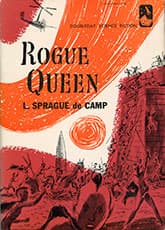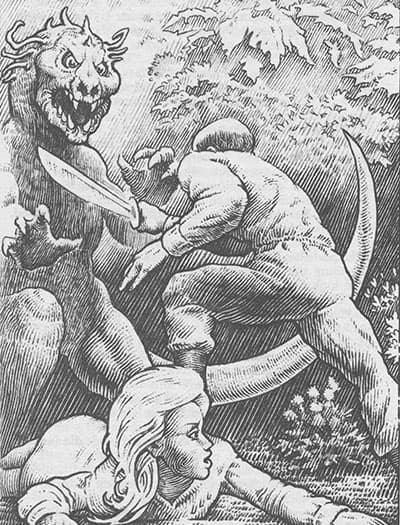Rogue Queen
Critique • Quotes
 First edition
First editionFirst publication
1951
Literature form
Novel
Genres
Science fiction
Writing language
English
Author's country
United States
Length
Approx. 72,000 words
The taming of the rogue
Rogue Queen is a novel that was ahead of its time in the waning years of science fiction's Golden Age but is practically archaic since the field's several resurgences.
It's still more than readable though and has a corny kind of old-fashioned charm today. Did we really think this was provocative stuff not so long ago? We may still find it so now, though for different reasons.
L. Sprague de Camp's best-known work is often cited as being a pioneer in the handling of sexuality in science fiction, a forerunner to some of Ursula K. Le Guin's work on shifting gender roles, such as The Left Hand of Darkness (1969).
Not that it's particularly feminist, or progressive at all, in theme. The story here is that an alien species organized on a hive basis—divided into drones, workers and the queen who reproduces—learns from human spacefarers that there's a different way to live. By adjusting their diets the sexless creatures can turn into functional males and females and form twosomes. The devotion of couples to each other is more important than their former love of the overall community, they discover.
You may notice here a few shots at collectivism. The hive mentality of the natives reminds the Terran visitors of Communism on their home planet, a great evil that had to be eradicated, they recall in this 1951 novel (yes, during the height of America's Red Scare). Their arguments against the communitarian approach, which seems to have worked for millennia for the Ormazdians, are laughably lame, but the hive people give in to changing their ways and natures after only a few hours of resistance. Monogamous marriage is almost immediately introduced.
And never mind that, as in the Star Trek tradition to come, the spacefarers have rules against interfering with local cultures. And that those directives barely slow them down in upending entire civilizations.
Feminine wiles
Moreover, the gender roles promoted to the aliens seem to be those of outdated American TV shows, with the males aggressively defending their weaker, child-bearing halves, while the newly functional women learn to direct their men from behind the scenes with their feminine wiles.
The sexuality in Rogue Queen—and in the rogue queen—is sexuality learned in a biology class. There's no explicit action, no heavy panting, no erotic element at all. Just a mathematical pairing off. Emotion in relationships is referred to as a bland, blind kind of force. And few of the confusing, sometimes destructive, complications of such feelings are raised.
One figure does stand out though as a potential feminist icon.
Iroedh (pronounced Ee-roe-eth, if I'm reading de Camp's guide to Ormazdian pronunciation correctly) is an undeveloped female worker with platonic feelings for a male drone Antis. More importantly she's more than a bit of a rebel, breaking her community's rules and joining with the Terran visitors to rescue Antis from a death sentence.
As she adds the previously forbidden meat to her diet, she becomes a "mature female" able to reproduce—in effect, a queen. She uses her sexuality, her ability to pull Antis's strings and her native cleverness to stave off attacks from a group of wild drones and ultimately to save her community from invasion by another community of their species.
A mixed bag as a feminist heroine, it seems. But Iroedh was one of the more promising female characters in the male-dominated science fiction of the time.
Space opera
Rogue Queen is an early entry in de Camp's Viagens Interplanetarias novels and stories. The series title meaning "Interplanetary Voyages" is presented in Portuguese, since the tales take place in a future world where Brazil is the leading power on Earth.
The works supposedly take their cue from the sword and sorcery stories of Edgar Rice Burroughs in which an Earthling engages in extraterrestrial battles, though de Camp replaces the sorcery elements with science. In place of a magical transference to another planet, the travellers arrive by spaceship to begin their thrilling adventures. True space opera.
As far as I know, Rogue Queen is a one-off. Iroedh and her planet Ormazd do not play roles in other Viagens Interplanetarias tales. Which is too bad, as this work is considered far above the others in the series.
It may have been ahead of its time in 1951, but it would be interesting to see how de Camp would have developed—or transformed—the character and the theme later in the series that ran into the 1990s, as the real world was evolving in its understanding of the male-female dynamic.
— Eric
Critique • Quotes


